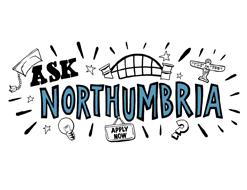-
Study
Study
Interested in studying at Northumbria? With 31,500 students, Northumbria is one of the largest universities in the country, offering courses on either a full-time, part-time or distance learning basis.
Discover more-
Undergraduate
- Undergraduate Study Degree
- Undergraduate Open Day & Events
- Application Guides
- Northumbria University UCAS Exhibitions
- Foundation Years
- Undergraduate Fees & Funding
- School & College Outreach
- Continuing Professional Development
-
Postgraduate
- Postgraduate Study Degree
- Postgraduate Research Degrees
- Postgraduate Open Days and Events
- Postgraduate Fees & Funding
- Flexible Learning
- Thinking about a Masters?
- Continuing Professional Development
- Change Direction
-
Student Life
- The Hub - Student Blog
- Accommodation
- Life in Newcastle
- Support for Students
- Careers
- Information for Parents
- Students' Union
- Northumbria Sport
-
-
International
International
Northumbria’s global footprint touches every continent across the world, through our global partnerships across 17 institutions in 10 countries, to our 277,000 strong alumni community and 150 recruitment partners – we prepare our students for the challenges of tomorrow. Discover more about how to join Northumbria’s global family or our partnerships.
Discover more-
Applying to Northumbria
- European Union
- Our London Campus
- Northumbria Pathway
- International Events
- Entry Requirements
- Agent Network
-
Northumbria Language Centre
- Faculty Requirements
- Acceptable English Requirements
- Pre-Sessional English and Study Skills
- Academic Language Skills Programmes (ALS)
-
International Fees, Funding & Scholarships
- International Undergraduate Fees
- International Undergraduate Funding
- International Masters Fees
- International Masters Funding
- International Postgraduate Research Fees
- International Postgraduate Research Funding
- International Money Matters
-
Life at Northumbria
- International student support
- The Hub - Student Blog
- Careers
-
International Mobility
- Current Northumbria Students
- Incoming Exchange Students
-
-
Business
Business
The world is changing faster than ever before. The future is there to be won by organisations who find ways to turn today's possibilities into tomorrows competitive edge. In a connected world, collaboration can be the key to success.
Discover more -
Research
Research
Northumbria is a research-rich, business-focused, professional university with a global reputation for academic quality. We conduct ground-breaking research that is responsive to the science & technology, health & well being, economic and social and arts & cultural needs for the communities
Discover more -
About Us
-
About Northumbria
- Our Strategy
- Our Staff
- Our Partners
- Student Profiles
- Alumni Profiles
- Leadership & Governance
- Academic Departments
- University Services
- History of Northumbria
- Contact us
- Online Shop
-
-
Alumni
Alumni
Northumbria University is renowned for the calibre of its business-ready graduates. Our alumni network has over 236,000 graduates based in 178 countries worldwide in a range of sectors, our alumni are making a real impact on the world.
Discover more - Work For Us
What will I learn on this module?
On this module you will learn the habit and discipline of sitting down to write regularly. You will also learn key techniques of prose fiction writing, writerly reflection and critical writing. In particular, you will engage in a range of ‘textual interventions’ that encourage you to explore how other writers write and how you can develop your own writing voice through engagement with that of others. In this way you will also learn to relate critical study of literary texts to writing practice.
How will I learn on this module?
The module is taught via a combination of lectures, seminars and workshops:
1 x 1 hour weekly lecture
1 x 2 hour seminar/workshop
Lectures provide an overview of particular topics and texts, with straightforward explanations of complex issues.
Seminars and workshops allow you to discuss challenging material with other students under the guidance of the module tutor and to develop your skills in writing and feedback through structured workshops. These sessions encourage you to engage with the set reading and to explore your own responses critically and creatively. Seminar and workshop discussions develop intellectual, practical and transferable skills.
The aim of this introductory module is to create a supportive environment in which your knowledge, confidence, creative and critical skills can develop.
The module makes appropriate use of technology enhanced learning through use of the Blackboard electronic learning platform and the online support offered by Northumbria’s SkillsPlus programme.
In addition to the scheduled lectures and seminars, you are expected to undertake both directed and independent learning. Directed learning includes preparation for seminars and workshops (including both reading and written work) individually or in small groups. Independent learning includes further reading and investigation, the consolidation of seminar materials, and revision/preparation for the module assignments.
How will I be supported academically on this module?
Your learning will be academically supported by peer and tutor feedback on your work within writing workshops as well as tutor-led debates around narrative theory and the key techniques of prose fiction writing; your tutor will facilitate set writing exercises and help trigger new work and provide tutorial support.
The module handbook provides details of lectures, seminars, reading lists and assessment criteria; lecture PowerPoint slides are made available on the e-learning platform, together with links to relevant skills materials in the library.
The module tutor is available in lectures and seminars, as well as during office hours, to discuss any queries or concerns you have.
Feedback in workshops on formative work serves as ‘feed forward’, giving guidance on how to improve during the module.
You are advised to see your Guidance Tutor at least twice each semester to review your academic progress. The Guidance Booklet, which you receive at the start of your first year, includes structured materials designed to help you develop your self-reflection skills. These materials underpin the academic side of the regular Guidance meetings, helping you to learn how to best use the feedback you receive on your assignments, how to build on your strengths, and improve in the areas where you could perform better.
What will I be expected to read on this module?
All modules at Northumbria include a range of reading materials that students are expected to engage with. The reading list for this module can be found at: http://readinglists.northumbria.ac.uk
(Reading List service online guide for academic staff this containing contact details for the Reading List team – http://library.northumbria.ac.uk/readinglists)
What will I be expected to achieve?
Knowledge & Understanding:
1. an appreciation of how the creative writing workshop works and the student role within the workshop
2. some understanding of the specific techniques relevant prose writing
Intellectual / Professional skills & abilities:
3. the ability to relate one’s own writing to wider debates in literary criticism
Personal Values Attributes (Global / Cultural awareness, Ethics, Curiosity) (PVA):
4. the ability to identify some of the strengths and weaknesses within own work
How will I be assessed?
Formative: Group workshops for producing, sharing and critiquing creative writing.
MLO 1, 4
Summative: you will submit a portfolio of work consisting of
a) a piece of textual intervention of 2,000 words of prose fiction, which responds creatively to one of the texts on your core English Literature modules. MLO 2
b) a critical commentary of 1,000 words on the construction of the textual intervention. The commentary should reflect critically on the technical strategies of the creative work, and how they relate to those of the original piece being responded to. You should try to contextualise your work by referencing wider critical debates relating to author, text and context. MLO 3, 4.
One overall mark will be given for the portfolio of work. Assignments a) and b) should be submitted together.
Feedback will be provided using the Departmental template and comments on the script
Pre-requisite(s)
None
Co-requisite(s)
EL4001 Introduction to Literary Studies
Module abstract
Please find details of this module in the other sections provided.
Course info
UCAS Code QW38
Credits 20
Level of Study Undergraduate
Mode of Study 3 years full-time or 4 years with a placement (sandwich)/study abroad
Department Humanities
Location City Campus, Northumbria University
City Newcastle
Start September 2024 or September 2025
All information is accurate at the time of sharing.
Full time Courses are primarily delivered via on-campus face to face learning but could include elements of online learning. Most courses run as planned and as promoted on our website and via our marketing materials, but if there are any substantial changes (as determined by the Competition and Markets Authority) to a course or there is the potential that course may be withdrawn, we will notify all affected applicants as soon as possible with advice and guidance regarding their options. It is also important to be aware that optional modules listed on course pages may be subject to change depending on uptake numbers each year.
Contact time is subject to increase or decrease in line with possible restrictions imposed by the government or the University in the interest of maintaining the health and safety and wellbeing of students, staff, and visitors if this is deemed necessary in future.
Your Learning Experience
Find out about our distinctive approach at
www.northumbria.ac.uk/exp
Admissions Terms and Conditions
northumbria.ac.uk/terms
Fees and Funding
northumbria.ac.uk/fees
Admissions Policy
northumbria.ac.uk/adpolicy
Admissions Complaints Policy
northumbria.ac.uk/complaints















